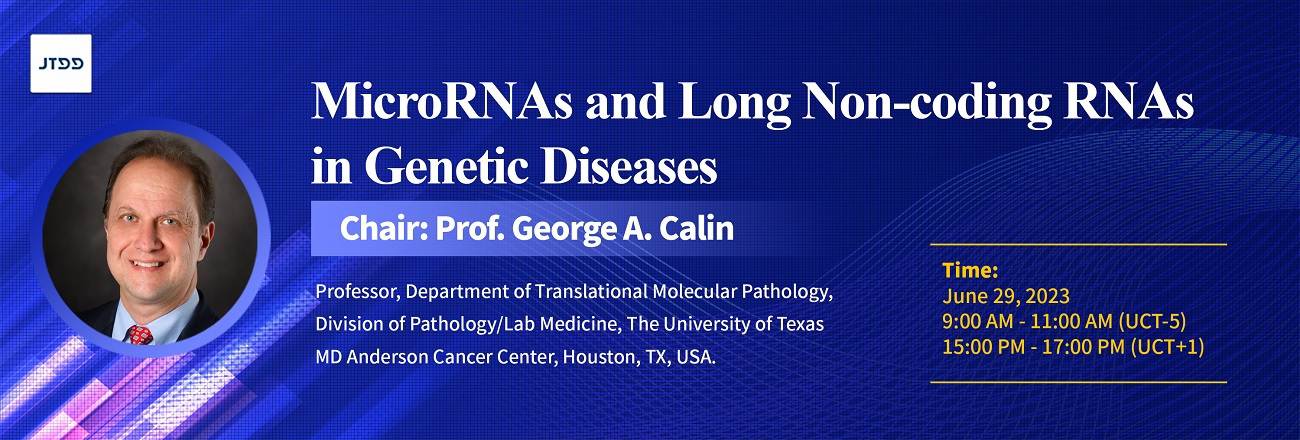Contents
Chair
Prof. George A. Calin
Department of Translational Molecular Pathology, Division of Pathology/Lab Medicine, The University of Texas MD Anderson Cancer Center, Houston, TX, USA.
Topic: About patterns, non-coding genome and therapeutics
Topic: About patterns, non-coding genome and therapeutics
Prof. Calin is the Professor of Department of Translational Molecular Pathology, Division of Pathology/Lab Medicine, The University of Texas MD Anderson Cancer Center; Co-Director, The RNA Interference and non-codingRNA Center, The University of Texas MD Anderson Cancer Center; Co-Director, MD/PhD Program, The University of Texas, Graduate School of Biomedical Sciences.
Prof. Calin was the first to discover the link between human cancers and microRNAs, a finding considered as a milestone in microRNA research history. He has now developed starting from July 2007 an independent research group at the M.D. Anderson Cancer Center in Houston and produced a new advance by linking new classes of non-coding RNAs to cancer. He is presently a Professor in Department of Translational Molecular Pathology at MDACC and studies the roles of microRNAs and other non-coding RNAs in cancer initiation and progression and in immune disorders, as well as the mechanisms of cancer predisposition linked to ncRNAs. Furthermore, he explores the roles of body fluids miRNAs as potential hormones and biomarkers, as well as new RNA therapeutic options for cancer patients. He has published over 600 scientific articles in prestigious journals, has been cited over 139,000 times (Google Scholar) and has received numerous awards and honors for his groundbreaking work in cancer research. He is the Highly Cited Researcher in the field of Clinical Medicine, ASCI Membership, American Society for Clinical Investigation, etc.
Prof. Calin was the first to discover the link between human cancers and microRNAs, a finding considered as a milestone in microRNA research history. He has now developed starting from July 2007 an independent research group at the M.D. Anderson Cancer Center in Houston and produced a new advance by linking new classes of non-coding RNAs to cancer. He is presently a Professor in Department of Translational Molecular Pathology at MDACC and studies the roles of microRNAs and other non-coding RNAs in cancer initiation and progression and in immune disorders, as well as the mechanisms of cancer predisposition linked to ncRNAs. Furthermore, he explores the roles of body fluids miRNAs as potential hormones and biomarkers, as well as new RNA therapeutic options for cancer patients. He has published over 600 scientific articles in prestigious journals, has been cited over 139,000 times (Google Scholar) and has received numerous awards and honors for his groundbreaking work in cancer research. He is the Highly Cited Researcher in the field of Clinical Medicine, ASCI Membership, American Society for Clinical Investigation, etc.
Speaker(s)
Prof. Carlo M. Croce
Department of Cancer Biology and Medical Genetics, The Ohio State University, Columbus, OH, USA.
Topic: MicroRNA expression to identify therapeutic targets
Topic: MicroRNA expression to identify therapeutic targets
Prof. Croce is the John W. Wolfe Chair in Human Cancer Genetics, The Ohio State University; Member of The National Academy of Sciences, the National Academy of Medicine, the Institute of Medicine of the National Academies, and the National Academy of Inventors; Fellow of the American Academy of Arts and Sciences, and the American Association for the Advancement of Science.
Prof. Croce is an Italian-American molecular geneticist and professor of medicine at Ohio State University. Renowned for his investigations of cancer pathogenesis, Prof. Croce has provided valuable insights into the underlying, genetic basis of cancer onset. His research has established genetic links to a variety of cancers including Burkitt's lymphoma, T-Cell lymphoma, and acute leukemia. He is a pioneer in the unraveling of the molecular basis of a number of lymphoma and leukemia cancers. In addition to his studies involving genes such as ALL1 and TCL1, Prof. Croce was the first investigator to discover and sequence BCL2. He later defined a role for this protein in various lymphomas such as follicular lymphoma. More recently, Prof. Croce's work has centered on understanding the role of micro RNAs in cancer pathogenesis. His research has proved that particular micro RNAs have the potential to exhibit either oncogenic or tumor suppressive properties. He has published over 1000 research papers and has been cited over 270,000 times (Google Scholar), making him one of the most highly cited researchers in the world.
Prof. Croce has received numerous awards and honors for his contributions to cancer research, including Charles S. Mott Prize from the General Motors Cancer Research Foundation (1993), the Scientific Excellence in Medicine Award from the American-Italian Cancer Foundation (1997), the Honor of Merit of Italian Republic (2000), the Henry M. Stratton Medal by the American Society of Hematology (2007), the Outstanding Investigator Award from the National Cancer Institute (2015); the Margaret Foti Award (2017), etc.
Prof. Croce is an Italian-American molecular geneticist and professor of medicine at Ohio State University. Renowned for his investigations of cancer pathogenesis, Prof. Croce has provided valuable insights into the underlying, genetic basis of cancer onset. His research has established genetic links to a variety of cancers including Burkitt's lymphoma, T-Cell lymphoma, and acute leukemia. He is a pioneer in the unraveling of the molecular basis of a number of lymphoma and leukemia cancers. In addition to his studies involving genes such as ALL1 and TCL1, Prof. Croce was the first investigator to discover and sequence BCL2. He later defined a role for this protein in various lymphomas such as follicular lymphoma. More recently, Prof. Croce's work has centered on understanding the role of micro RNAs in cancer pathogenesis. His research has proved that particular micro RNAs have the potential to exhibit either oncogenic or tumor suppressive properties. He has published over 1000 research papers and has been cited over 270,000 times (Google Scholar), making him one of the most highly cited researchers in the world.
Prof. Croce has received numerous awards and honors for his contributions to cancer research, including Charles S. Mott Prize from the General Motors Cancer Research Foundation (1993), the Scientific Excellence in Medicine Award from the American-Italian Cancer Foundation (1997), the Honor of Merit of Italian Republic (2000), the Henry M. Stratton Medal by the American Society of Hematology (2007), the Outstanding Investigator Award from the National Cancer Institute (2015); the Margaret Foti Award (2017), etc.
Prof. Manel Esteller
Josep Carreras Leukemia Research Institute (IJC), Badalona, Barcelona, Catalonia, Spain.
Topic: Non-coding RNAs, epigenetics and epitranscriptomics in cancer: tying it all together
Topic: Non-coding RNAs, epigenetics and epitranscriptomics in cancer: tying it all together
Prof. Esteller is the Director of the Josep Carreras Leukaemia Research Institute (IJC) in Badalona; Chairman of Genetics at the School of Medicine of the University of Barcelona, and an ICREA Research Professor; Member of the Academia Europaea.
Prof. Esteller is the leader in Cancer Epigenetics. His research is devoted to the establishment of the cancer epigenome. From October 2001 to September 2008, he was the Leader of the CNIO Cancer Epigenetics Laboratory, where his principal areas of research were alterations in DNA methylation, histone modifications and chromatin in human cancer. He continued research in this field as the Director of the Cancer Epigenetics and Biology Program (PEBC) at the Bellvitge Biomedical Campus of Barcelona for ten years. His current research is devoted to the establishment of the epigenome and epitranscriptome maps for normal and transformed cells, the study of the interactions between epigenetic modifications and non-coding RNAs, and the development of new epigenetic drugs for cancer therapy.
He is the author of more than 500 original publications in peer-reviewed scientific journals and has been cited over 130,000 times (Google Scholar), 24 of them categorized as "Highly Cited Paper"s by Thomson Reuters, he is among the most cited researchers in the world (top 1%) with the recognition "Highly Cited Researcher" by Clarivate Analytics for many years. He has received numerous awards and honors for his contributions to the field of epigenetics, including the "Rey Jaime I" Research Award (2013);the National Award in Oncology (2014); the National Research Award of the Government of Catalonia (2015); the Innovation in Healthcare Oncology Award (2018) and so on and has been Elected Member of the Academia Europaea (2021).
Prof. Esteller is the leader in Cancer Epigenetics. His research is devoted to the establishment of the cancer epigenome. From October 2001 to September 2008, he was the Leader of the CNIO Cancer Epigenetics Laboratory, where his principal areas of research were alterations in DNA methylation, histone modifications and chromatin in human cancer. He continued research in this field as the Director of the Cancer Epigenetics and Biology Program (PEBC) at the Bellvitge Biomedical Campus of Barcelona for ten years. His current research is devoted to the establishment of the epigenome and epitranscriptome maps for normal and transformed cells, the study of the interactions between epigenetic modifications and non-coding RNAs, and the development of new epigenetic drugs for cancer therapy.
He is the author of more than 500 original publications in peer-reviewed scientific journals and has been cited over 130,000 times (Google Scholar), 24 of them categorized as "Highly Cited Paper"s by Thomson Reuters, he is among the most cited researchers in the world (top 1%) with the recognition "Highly Cited Researcher" by Clarivate Analytics for many years. He has received numerous awards and honors for his contributions to the field of epigenetics, including the "Rey Jaime I" Research Award (2013);the National Award in Oncology (2014); the National Research Award of the Government of Catalonia (2015); the Innovation in Healthcare Oncology Award (2018) and so on and has been Elected Member of the Academia Europaea (2021).
Prof. Frank J. Slack
HMS Initiative for RNA Medicine, Department of Pathology, Beth Israel Deaconess Medical Center, Harvard Medical School, Boston, Massachusetts, MA, USA.
Topic: Towards microRNA therapeutics in cancer
Topic: Towards microRNA therapeutics in cancer
Prof. Slack is the Professor, Pathology, Harvard Medical School and Beth Israel Deaconess Medical Center; the Director, Institute for RNA Medicine, BIDMC Cancer Center, Beth Israel Deaconess Medical Center.
The Slack lab seeks to translate their discoveries of the roles of microRNAs into potential cures and biomarkers for cancer and aging. His lab has pioneered various aspects of the microRNA field and continues to make important contributions to this aspect of post-transcriptional control of gene regulation in stem cell development, cancer and aging. For example: they were co-discoverers of the second known microRNA, let-7 (Reinhart et al. Nature 2000), and the co-discoverers of the first known human microRNA (Pasquinelli et al. Nature 2000); his lab discovered that human let-7 is a critical determinant of lung cancer and that it regulates the important oncogene, RAS (Johnson et al. Cell 2005). This provided the first mechanism for a microRNAs role in cancer, and helped propel microRNAs in to the spotlight as potential causes and cures for cancer (Esquela-Kerscher and Slack. Nature Rev. Cancer, 2006), etc.
The Slack lab seeks to translate their discoveries of the roles of microRNAs into potential cures and biomarkers for cancer and aging. His lab has pioneered various aspects of the microRNA field and continues to make important contributions to this aspect of post-transcriptional control of gene regulation in stem cell development, cancer and aging. For example: they were co-discoverers of the second known microRNA, let-7 (Reinhart et al. Nature 2000), and the co-discoverers of the first known human microRNA (Pasquinelli et al. Nature 2000); his lab discovered that human let-7 is a critical determinant of lung cancer and that it regulates the important oncogene, RAS (Johnson et al. Cell 2005). This provided the first mechanism for a microRNAs role in cancer, and helped propel microRNAs in to the spotlight as potential causes and cures for cancer (Esquela-Kerscher and Slack. Nature Rev. Cancer, 2006), etc.
Prof. Isidore Rigoutsos
Computational Medicine Center, Sidney Kimmel College of Medicine, Thomas Jefferson University, Philadelphia, PA, USA.
Topic: Where in the cell do short RNAs go?
Topic: Where in the cell do short RNAs go?
Prof. Rigoutsos is the Professor, Department of Pathology Anatomy and Cell Biology, Department of Biochemistry and Molecular Biology and Department of Cancer Biology, Thomas Jefferson University.
Prof. Rigoutsos is the Founding Director of the Computational Medicine Center (http://cm.jefferson.edu) at Thomas Jefferson University. Prof. Rigoutsos is the inaugural holder of the University's Richard W. Hevner Chair in Computational Medicine. Prior to joining Jefferson in 2010, Prof. Rigoutsos spent 18 years at IBM's Thomas J. Watson Re-search Center, where he worked on Computational Biology. The Rigoutsos lab studies post-transcriptional regulation by non-coding RNAs, including microRNAs, isomiRs, tRNAs, tRNA-derived fragments, pyknons, and, piRNAs. In recent years, the lab made several key contributions to our understanding of the molecular biology of health disparities. Specifically, the lab was first to show that, in human tissues, the production of miRNA isoforms (isomiRs) and of tRNA-derived frag-ments (tRFs) is constitutive. Moreover, the lab showed that the abundances of isomiRs and tRFs de-pend on an individual's sex, population origin, race/ethnicity, tissue, tissue state, and disease.
Prof. Rigoutsos is the Founding Director of the Computational Medicine Center (http://cm.jefferson.edu) at Thomas Jefferson University. Prof. Rigoutsos is the inaugural holder of the University's Richard W. Hevner Chair in Computational Medicine. Prior to joining Jefferson in 2010, Prof. Rigoutsos spent 18 years at IBM's Thomas J. Watson Re-search Center, where he worked on Computational Biology. The Rigoutsos lab studies post-transcriptional regulation by non-coding RNAs, including microRNAs, isomiRs, tRNAs, tRNA-derived fragments, pyknons, and, piRNAs. In recent years, the lab made several key contributions to our understanding of the molecular biology of health disparities. Specifically, the lab was first to show that, in human tissues, the production of miRNA isoforms (isomiRs) and of tRNA-derived frag-ments (tRFs) is constitutive. Moreover, the lab showed that the abundances of isomiRs and tRFs de-pend on an individual's sex, population origin, race/ethnicity, tissue, tissue state, and disease.
Dr. Manuela Ferracin
Department of Medical and Surgical Sciences (DIMEC), University of Bologna, Bologna, Italy.
Topic: MicroRNA biomarkers: opportunities and challenges
Topic: MicroRNA biomarkers: opportunities and challenges
Dr. Ferracin is the Associate Professor, Department of Medical and Surgical Sciences, University of Bologna, Bologna, Italy.
Dr. Ferracin has a strong background in molecular oncology, with a specific expertise in the identification of diagnostic or prognostic gene signatures. As a PhD student in Prof. Negrini's lab, she collaborated with Prof. George Calin and Prof. Carlo Croce, when they published the first papers showing an association between microRNAs and cancer. They developed the first microarray for microRNA expression analysis. She applied this novel technology to the discovery of microRNAs and non-coding RNAs involved in leukemia, breast cancer and other solid tumors (PNAS, 2004; NEJM, 2005; CancerCell, 2007). In 2012, she obtained the prestigious My First AIRC Grant to study circulating microRNAs in biological fluids of cancer patients. She identified cancer-specific signatures of cell-free microRNAs for cancer diagnosis. Following her recruitment as Professor at the University of Bologna in 2016, she established her independent research group and obtained a grant as PI from Bologna University (Almaidea), to study methylation alteration in stage II colorectal cancer (CancerLett, 2018). She is currently working on the identification of melanoma prognostic biomarkers and the development of patient-derived cancer models.
Dr. Ferracin has a strong background in molecular oncology, with a specific expertise in the identification of diagnostic or prognostic gene signatures. As a PhD student in Prof. Negrini's lab, she collaborated with Prof. George Calin and Prof. Carlo Croce, when they published the first papers showing an association between microRNAs and cancer. They developed the first microarray for microRNA expression analysis. She applied this novel technology to the discovery of microRNAs and non-coding RNAs involved in leukemia, breast cancer and other solid tumors (PNAS, 2004; NEJM, 2005; CancerCell, 2007). In 2012, she obtained the prestigious My First AIRC Grant to study circulating microRNAs in biological fluids of cancer patients. She identified cancer-specific signatures of cell-free microRNAs for cancer diagnosis. Following her recruitment as Professor at the University of Bologna in 2016, she established her independent research group and obtained a grant as PI from Bologna University (Almaidea), to study methylation alteration in stage II colorectal cancer (CancerLett, 2018). She is currently working on the identification of melanoma prognostic biomarkers and the development of patient-derived cancer models.
Programme
Programme
- Time(UTC-5 )
- Speaker
- Topic
- 9:00 - 9:05 AM
- George A. Calin
- Welcoming speech
- 9:05 - 9:35 AM
- Manel Esteller
- Non-coding RNAs, epigenetics and epitranscriptomics in cancer: tying it all together
- 9:35 - 10:05 AM
- Carlo M. Croce
- MicroRNA expression to identify therapeutic targets
- 10:05 - 10:35 AM
- Manuela Ferracin
- MicroRNA biomarkers: opportunities and challenges
- 10:35 - 11:05 AM
- Isidore Rigoutsos
- Where in the cell do short RNAs go?
- 11:05 - 11:35 AM
- Frank J. Slack
- Towards microRNA therapeutics in cancer
- 11:35 - 12:05 PM
- George A. Calin
- About patterns, non-coding genome and therapeutics
- 12:05 - 12:10 PM
- JTGG Editorial Office
- Journal introduction
- 12:10 - 12:20 PM
- George A. Calin
- Summary





